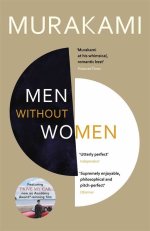What happens to men when the women in their lives leave—whether by death, separation, or emotional disappearance?
In contrast to some of his more surreal works, Men Without Women is more grounded—almost eerily so. The emotions linger not because of fantasy but because of how real the pain, confusion, and loneliness feel. This is the main question in Haruki Murakami's collection of short stories, Men Without Women, which, as the title suggests, is about the absence of women and what that absence does to the human psyche.
The Stories
Each of the seven short stories in the collection examines various facets of loneliness. A man laments the suicide of a past romantic partner. Another makes friends with his ex-wife's new partner. After hiring a quiet young driver, a lonely actor begins to face his own emotional numbness.
"Kino," which seems like a gradual plunge into an emotional haze, is one particularly noteworthy story. After a failed marriage, the protagonist opens a bar only to be surrounded by odd happenings, including silent regulars, snakes, and strange dreams. There is a tangible sense of dread, even though it's never obvious if the threats are actual or symbolic.
The surreal twist of "Samsa in Love," in which Gregor Samsa (from Kafka's The Metamorphosis) re-emerges as a human, is another noteworthy entry. However, he's uncomfortable, exposed, and unsure of his own desires this time. It's strange and heartwarming—quite Murakami.
Themes That Linger
Men Without Women is fundamentally about emotional detachment. These men are quietly hollowed out rather than dramatically broken. They work, eat, and function, but they stray. The stories are so captivating because of this. Murakami also explores masculinity—not the loud, performative kind, but the quiet crisis that happens when emotional expression is stifled. These are men who don’t know how to grieve properly. Or love. Or even understand their own loneliness.
What’s brilliant is how Murakami uses minimalist prose to express deeply complex emotions. Although his sentences are frequently simple, they produce echoes. You experience what the characters are unable to express.
Why it Matters?
Men Without Women serves as a reminder that emotional isolation still exists beneath the surface in a fast-paced world that glorifies continuous connection—through screens, apps, and social media feeds. The book isn't noisy. It doesn't preach. It just shows the reader what they're prepared to face by holding up a mirror.
This book is a quiet storm for anyone with an interest in gender, psychology, or contemporary relationships. It provides recognition but no answers. And that can be more potent at times.
Final Thoughts
Men Without Women may irritate you if you prefer clean endings or fast-paced drama. However, Murakami's quiet masterpiece is worth your time if you enjoy stories that explore ambiguity, sit with sadness, and reveal more with each reread.
Have you read this book or any other Murakami work?
What’s your take on emotional silence in men? Is loneliness a choice, a condition, or a consequence? Let’s talk.

In contrast to some of his more surreal works, Men Without Women is more grounded—almost eerily so. The emotions linger not because of fantasy but because of how real the pain, confusion, and loneliness feel. This is the main question in Haruki Murakami's collection of short stories, Men Without Women, which, as the title suggests, is about the absence of women and what that absence does to the human psyche.
The Stories
Each of the seven short stories in the collection examines various facets of loneliness. A man laments the suicide of a past romantic partner. Another makes friends with his ex-wife's new partner. After hiring a quiet young driver, a lonely actor begins to face his own emotional numbness.
"Kino," which seems like a gradual plunge into an emotional haze, is one particularly noteworthy story. After a failed marriage, the protagonist opens a bar only to be surrounded by odd happenings, including silent regulars, snakes, and strange dreams. There is a tangible sense of dread, even though it's never obvious if the threats are actual or symbolic.
The surreal twist of "Samsa in Love," in which Gregor Samsa (from Kafka's The Metamorphosis) re-emerges as a human, is another noteworthy entry. However, he's uncomfortable, exposed, and unsure of his own desires this time. It's strange and heartwarming—quite Murakami.
Themes That Linger
Men Without Women is fundamentally about emotional detachment. These men are quietly hollowed out rather than dramatically broken. They work, eat, and function, but they stray. The stories are so captivating because of this. Murakami also explores masculinity—not the loud, performative kind, but the quiet crisis that happens when emotional expression is stifled. These are men who don’t know how to grieve properly. Or love. Or even understand their own loneliness.
What’s brilliant is how Murakami uses minimalist prose to express deeply complex emotions. Although his sentences are frequently simple, they produce echoes. You experience what the characters are unable to express.
Why it Matters?
Men Without Women serves as a reminder that emotional isolation still exists beneath the surface in a fast-paced world that glorifies continuous connection—through screens, apps, and social media feeds. The book isn't noisy. It doesn't preach. It just shows the reader what they're prepared to face by holding up a mirror.
This book is a quiet storm for anyone with an interest in gender, psychology, or contemporary relationships. It provides recognition but no answers. And that can be more potent at times.
Final Thoughts
Men Without Women may irritate you if you prefer clean endings or fast-paced drama. However, Murakami's quiet masterpiece is worth your time if you enjoy stories that explore ambiguity, sit with sadness, and reveal more with each reread.
Have you read this book or any other Murakami work?
What’s your take on emotional silence in men? Is loneliness a choice, a condition, or a consequence? Let’s talk.

